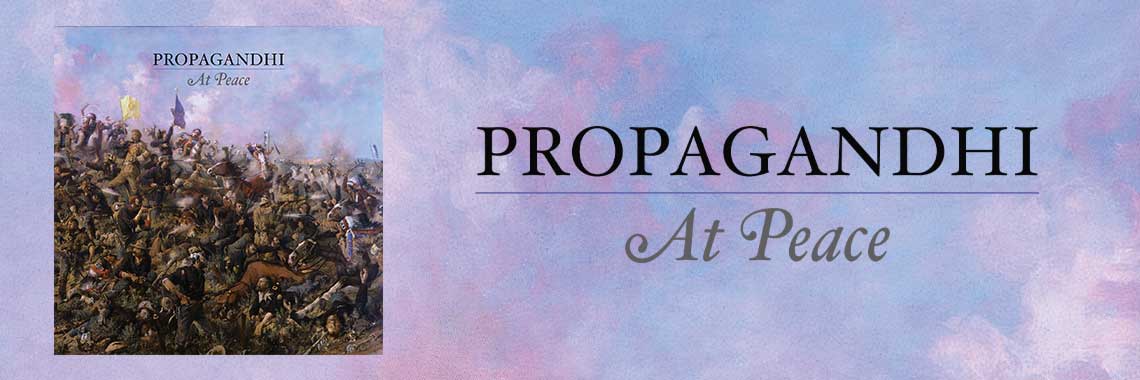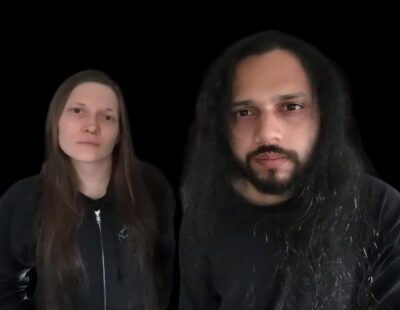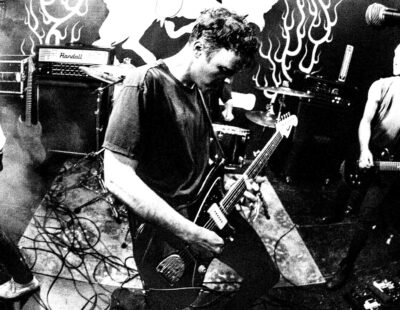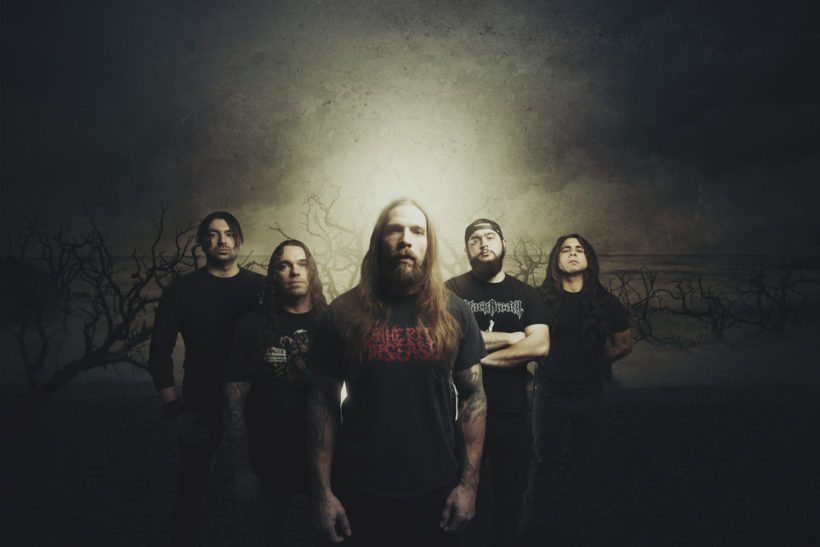
Jeremy Wagner (second from the left) and Broken Hope
1988: Horror franchises Nightmare on Elm Street, Friday the 13th, and Halloween all released new chapters as studios tried capitalizing on the waning slasher frenzy. Meanwhile, Windy City horror fanatic Jeremy Wagner was part of a rising death metal behemoth as the founding guitarist of Broken Hope.
The nightmare continues as Broken Hope’s seventh LP—Mutilated and Assimilated—seeks out the nearest breathing host for its contagious hostility. The Century Media Records release was recorded and unleashed near some meaningful anniversaries, as studio time was scheduled a quarter-century after the band’s Swamped in Gore debut. Also, the band’s dirty-thirty birthday lurks in 2018. But this isn’t some nostalgic stroll down memory lane for Wagner and his revamped lineup. Sure, Mutilated and Assimilated honors Broken Hope’s legacy and finds strength in the past—but it does so without dwelling in the afterbirth. The result is an inspired death metal record that feels like a lethal new mutation; like the creature from The Thing adapting to claim its next victim.
Below, read Jeremy Wagner’s extensive conversation with Decibel about Mutilated and Assimilated, the highs and lows of Broken Hope’s history, and his undying passion for horror and death metal. But first, get reacquainted with Broken Hope on their newest title track:
First off, amazing work on Mutilated and Assimilated. On first listen I was really pulled towards “Outback Incest Clan” and “The Necropants.”
Jeremy Wagner: Thanks so much for that. Music to my ears hearing this. Cool you mention “The Necropants.” That song is very special to me because it’s the first song of all the songs and riffs I wrote for the album with one of Jeff Hanneman’s guitars. Though I wrote and recorded exclusively with Hanneman’s guitars, “The Necropants” was the first tune that came out of me when I plugged in a Hanneman ESP (USA Custom) he used on the God Hates Us All album. When I plugged in and started to riff out with Mike, “The Necropants” just fucking flowed from my hands. I wrote that song in five minutes from start to finish!
Did you have any specific goals for this record or adjustments you wanted to make after Omen of Disease, or did the songs just come together organically?
JW: The songs really came together organically; [it was] natural and felt right. More instrumental delineation, and more intense sonic treatment with mixing and mastering was paramount. One thing I sure as hell didn’t want was this album being bounced around to three studios like the last time! That was a nightmare, and we had too many cooks in the kitchen. I’m satisfied with the production and mix of Omen [of Disease], but it’s also something I wasn’t content with as a daddy to Broken Hope. This time around, the mission was to use my new studio and not be on someone else’s clock. That way I’d be able to take time with every instrument tone, vocal patterns, dialing in the maximum audio quality possible, and nailing the “Broken Hope sound” that we’re known for, and that I personally love. Tone and the sonic treatment you mention are paramount to me. I’ve always strived for quality while retaining the “sound” I love to play and convey.
There’s a reason Slayer sounds like Slayer; they’re very comfy with their guitar tones, vocal style, and they don’t fix what isn’t broken. I respect that and embrace that. I still love my formula and how it makes me feel to play my sound.
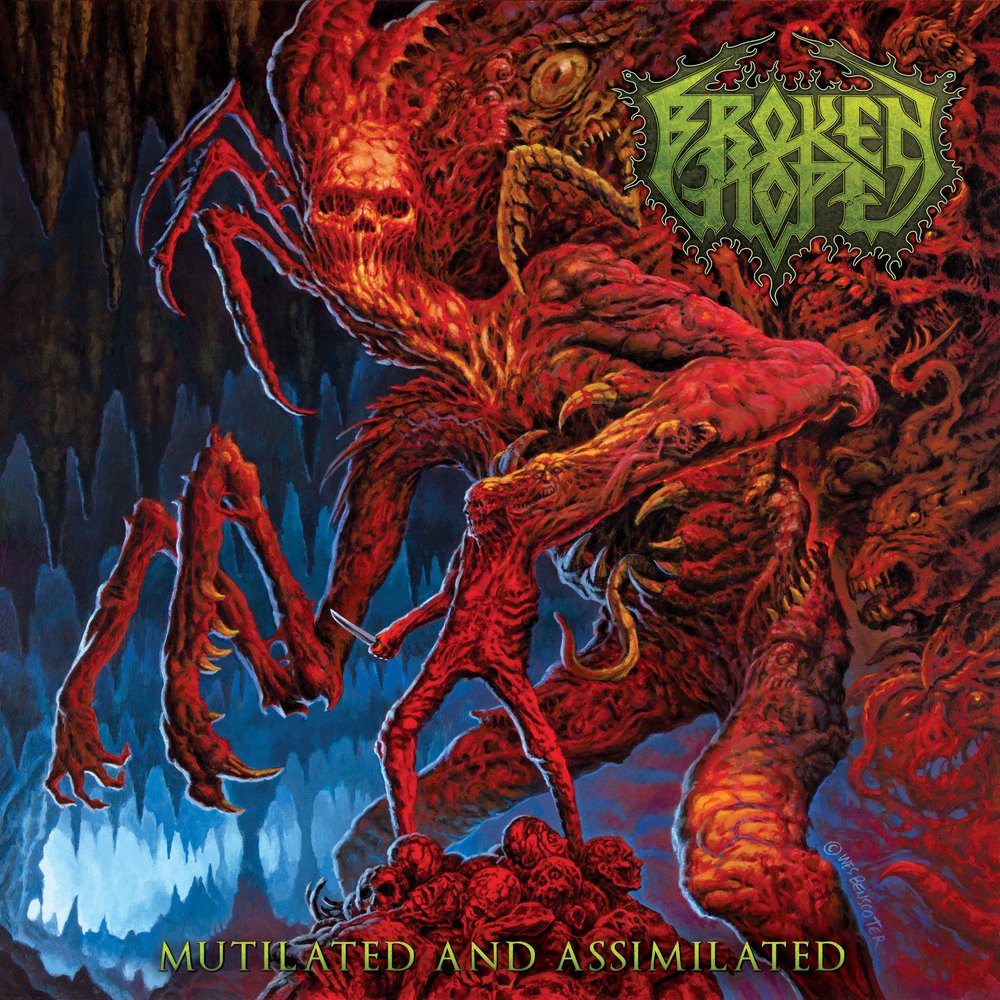
How was the recording experience?
When Scott Creekmore was co-producing and mixing this album, he said he wanted to experiment with different amps/cabs and micing techniques. But mainly, he just focused on good performances instead of trying to fix it with editing. He was all about doing a “take with vibe” over a “perfect take that is too sterile.” The songwriting sessions for Mutilated and Assimilated were really cool and easy. I wrote all my stuff either at home or with [drummer] Mike Miczek, and I contributed two riffs to one of [vocalist] Damian [Leski]’s songs. Overall, the writing went smoothly; everyone on the same page, striving for the best material to bring to the table, positive vibes, and really a team effort with the arrangements and overall quality-control.
I also feel Mutilated and Assimilated is a better/stronger album than Omen of Disease because Mutilated and Assimilated has better production and a better mix. The addition of [guitarist] Matt Szlachta and [bassist] Diego [Soria] upped our game when it came to bass guitar and lead guitars. The real “team effort” made the new album the best it could be. We didn’t settle for anything weak, be it song strengths, the mix, and even the artwork. The point of all that studio intel is to hammer home that the home studio actually set the tone for a comfy place to write and record organically. Catch my drift?
I loved the tribute to Swamped in Gore at the end of the record. Was that a decision to come full-circle since the band was created almost 30 years ago? How do you view those early recordings at this point?
JW: I adore all those old recordings. Every Broken Hope [album] has a place in my heart. We play many old songs from across our catalog live. Those old songs and albums bring me back to special times and memories in my life—and they live as a direct connection from my heart and mind to Joe [Ptacek] and Ryan [Stanek]—RIP.
The re-recording of “Swamped In Gore” and “Gorehog” was a total tribute and salute to our debut album as it celebrated it’s 25th anniversary in 2016. I wanted to redo those songs as one solid piece of respect to the history.
It’s definitely a crazy thing to think about that Broken Hope first began 30 years ago next year! There’s a realization that time flies very fast. I feel like only a day has gone by since I was in Ryan Stanek’s basement with him and Joe Ptacek in 1988, writing our first demo and trying to get shows. I still feel like I’m a young man, hungry and ready to do whatever it takes to get signed, make albums, and tour the world. I’m both amazed that I’m still here, 30 years into Broken Hope, but, I’m also not surprised! I say that because I honestly have always felt that Broken Hope would be one of my greatest creations and that I’d be writing and playing Broken Hope’s music for most of my life. It’s a real deep and strong feeling I’ve had. Kinda like I had blinders on and only saw Broken Hope existing as long as I was going to breathe oxygen—from age 18 to the grave.
Does the title link thematically to any of the songs, or does it first and foremost reflect your passion for horror?
JW: The title track specifically is a direct tribute to both the John Carpenter movie The Thing and the original short story “Who Goes There” by John W. Campbell Jr. Carpenter’s 1982 adaptation of Campbell’s 1938 story is actually very much the same.
That all said, the concept of The Thing in film and story hit a nerve in me like no other tale—written or on film. The movie is my favorite horror film of all time. It’s very unsettling every time I watch it. There’s not a more original idea in horror to this day and there’s no better practical FX on screen since, either. Therefore, I felt compelled to write a song/lyrics about it. And it’s pretty cool that it turned out to be the title track now. I’m proud to pay such tribute to this amazing film and to John W. Campbell Jr.
Also, there’s actually an instrumental outro titled, “Beneath Antarctic Ice,” which is also a nod to The Thing. Other than that, no other songs are based on horror movies, but many are based on horror reality. For example, these songs are all based on true events: “The Bunker,” “Outback Incest Clan,” “The Necropants,” and “Russian Sleep Experiment.”
Then we have Wes Benscoter who returned to do this album cover for Broken Hope, and he went above and beyond with his vision and talent. When you see the album artwork, it’s like you have stumbled upon The Thing beneath Antarctic ice while it’s in the midst of transforming into a thousand different mutations. It’s fucking horrifying and brilliant!
To that end, specific to your mention of my passion for horror: Yes, this album reflects my passion for horror. Hell, every Broken Hope album reflects my passion for horror in the lyrics. I have one of the largest horror memorabilia collections just beneath Kirk Hammett, Greg Nicotero, Guillermo del Toro, and the late, great Forrest Ackerman. I’ve always lived, breathed, and loved horror culture! I’m a published horror novelist, too, so it’s only natural that all that macabre stuff oozes out into my musical art.
Are there any horror films from the past couple years that received your enthusiastic stamp of approval?
JW: There’s not many new movies that really blow my hair back. I’ll say that I really like Cabin In the Woods, the prequel of The Thing (it’s not a remake!), and I dig the Ash Vs. Evil Dead TV series.
When I was thinking of the Broken Hope hiatus after Grotesque Blessings, a line from one of your stories stuck out to me: “Purgatory ain’t so bad. It gives you time to reflect.” Did time away from the band end up making you even hungrier to create music for Broken Hope again?
JW: I never wanted to take a break from Broken Hope in 2002. In the past, in-fighting, immaturity, egos, drama, and just members who became liabilities unfortunately robbed the band of the fun, seriousness, and professionalism I personally aspired to. I took a break because of that shit. I did a band during my decade off of Broken Hope and the band was called Lupara. That band wasn’t exactly my “voice,” but it kept me busy and we managed to put out one album and a video nominated for “Best Metal Video” on MTV’s Headbanger’s Ball. Not bad for trying.
That said, I was sitting on Flesh Mechanic riffs and a bunch of other riffs for Broken Hope—so I never stopped writing Broken Hope music and I also never stopped doing Broken Hope interviews or talking to fans.
The old shit-talking/backstabbing fools who made me take a break are gone from my life. I needed that time to get on track. I don’t suffer any of that kind of thing anymore. It took 29 years but I have what I’d call a “dream lineup.”
Now, I’d be remiss if I didn’t acknowledge that I truly am grateful for the contributions of former Broken Hope members, because I am. But I think that negativity can maybe alter the vibe of a band. Sure, it can still be pissed-off and epic, but what could have been if you were all getting along in the band behind the scenes? I believe a band who’s positive and serious about their music and having a good time writing and recording it, well, that’s gonna make a better album. And that’s where the “Broken Hope spirit” is the same as it was since or before Grotesque Blessings—and maybe the “feel” has changed—but for the BETTER and for the BRUTAL! Capisce?
The spirit remains the same; still out to crush the world with sick death metal and have fun doing it. We are doing it for the passion that we have for this music. Still hungry!
When it comes to the “feel” being different this time around—Broken Hope 2017/7th album—I have a pretty good idea why that “feel” is what it is. It’s a feeling and vibe that harbors a new strength and positive delivery in the brutality. Does that make sense? It’s the new blood in the band making the “feel” a ferocious and serious thing. Matt and Diego brought a true passion for their instruments and for death metal into Broken Hope—and they brought brotherhood and that positive delivery I mentioned. I’ve never experienced this before in Broken Hope before, and am I ever grateful for this lineup and genuine comradery.
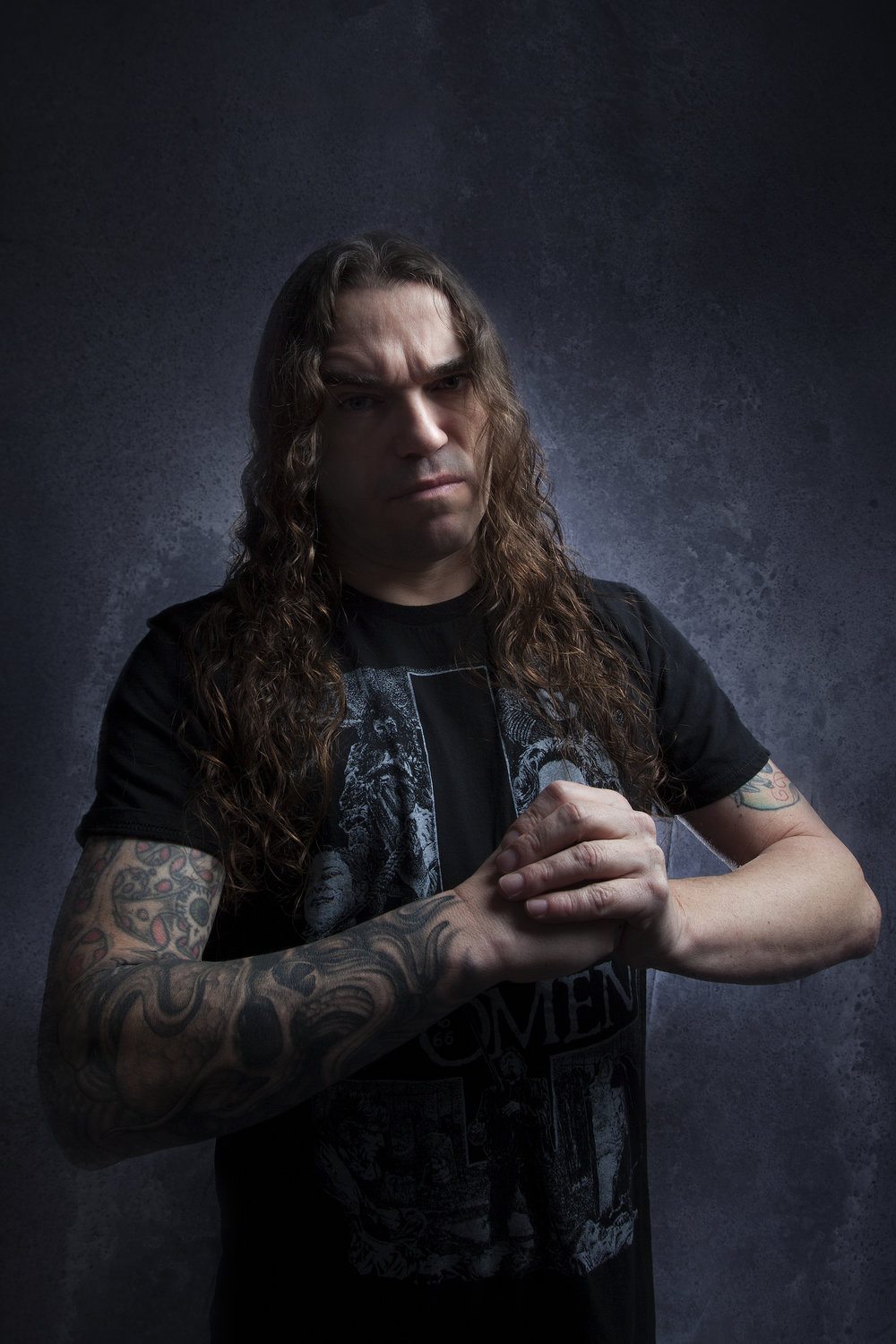 Jeremy Wagner of Broken Hope
Jeremy Wagner of Broken Hope
To me, creative journeys often involve discovering your voice and identity, then challenging yourself to perfect that voice. How has your own creative identity—musically and as a fiction writer—evolved over time?
JW: I think over time I’ve matured and really have a handle of my craft—writing music and writing lyrics. I have developed great radar for what sounds good to me in a riff and recording, and what will hammer home in the lyrics I write in a strong, succinct, and memorable way. I fucking love being a guitarist and I fucking love being a writer/author. I believe I do have a voice—a musical voice and a written-word voice—just as a veteran songwriter and veteran author has. I don’t want to sound arrogant with that; I still have a long way to go, even after all these years, but I’m getting there, and I think my “voices” are more distinct and original than ever before. And I’m definitely a killer editor—except with editing my interview answers! (Laughs)
You’ve seen death metal trends come and go. How do you think the death metal genre has changed since you formed Broken Hope?
JW: There’s many great bands in this genre who are new “millennial bands,” but for some reason, they’re not breaking major ground that the founding fathers haven’t already smashed. That said, it seems that death metal is more popular than ever. Once thing I find is that there’s thousands of kids who just discovered death metal and love the old bands, or there’s thousands of kids who also discovered death metal, but they think it’s a new form of “deathcore!” (Laughs) It’s funny and it also makes me want to teach a death metal history class to everyone!
What do you think of the current state of death metal? Is it stronger than ever, or propped up mainly by the contributions of genre pioneers?
JW: I feel it is indeed stronger than ever. The classic bands still prop it up to this day. And it’s the boatload of veteran bands who are making 2017 the greatest year of death metal in a long time: Immolation, Origin, Obituary, Dying Fetus, Suffocation, Behemoth, Six Feet Under, and many more. That all makes me really happy to say.
What was your earliest memory of discovering extreme music? When did you realize death metal was a new genre that you had helped establish?
JW: I was a teenager always seeking out heavier and heavier music. As a fan and a guitarist, the heavier the better. First it was Metallica, Slayer and Celtic Frost. Not long after, I discovered Morbid Angel, Carcass, Death, Obituary, Napalm Death, Terrorizer and more. Way back in 1988 when Broken Hope first formed, I took a road trip to NYC and Buffalo and Milwaukee and Chicago to see Morbid Angel, Immolation, Revenant, Baphomet, Ripping Corpse, Death, Obituary, and more. Those were early experiences that blew my mind and changed my path.
Look, here’s nothing heavier than death metal and grindcore. I fucking live and breathe death metal. That’ll never change. I’m a lifer because I’m in love with a genre of music that gives me pure sonic pleasure and a release like no other.
Have you ever felt frustrated with death metal itself or fan expectations to rigidly adhere to genre conventions? Or is the genre just as small as you allow it be?
JW: I haven’t felt frustrated with the genre or fan expectations. I’ve only been frustrated with people who didn’t take death metal seriously. Like, just dismiss it as garbage. But I was younger when I felt that way. I don’t care what anyone thinks now. (Laughs)
In your experience, is there a sense of community or family within death metal?
JW: Absolutely. There’s none more loyal to this genre than the death metal community. As I mentioned before, It’s the culture and brotherhood/sisterhood that makes it live and breathe. And you see the same faces at festivals and death metal shows around the world. This genre is important to people, it’s a major part of their lives, and I love that and never take that for granted. Hell, I am a death metal fan first and foremost.
Is there a story or memorable experience that captures your experiences with death metal?
JW: The most memorable experience I’ve had that encapsulates death metal’s legacy—or at least Broken Hope legacy—is when one of my heroes, Kirk Hammett, came out to see Broken Hope in concert a few years ago, and basically said my guitar tone was super fucking heavy and the band just crushed. That’s something this kid will never forget—and it says something when the godz take notice of your music.
Moreover, I just want to add that I’ve seen death metal given more and more props in the last 25 years. For example, there was Cannibal Corpse in a movie—Ace Ventura: Pet Detective—death metal is mentioned on talk shows, death metal gets mentioned in Rolling Stone, and just this last week I finished a new, New York Times bestselling novel by one of my favorite authors—Peter Blauner. The book is called Proving Ground and it in it, there’s a reference to “DEATH METAL.” My point is that this genre can’t be ignored, and more of the mainstream is taking notice. But the beautiful thing about all that is that death metal still remains underground. It’s ours, and I love that.
Mutilated and Assimilated will be available from Century Media on June 23rd. Pre-Order it from the label HERE and follow Broken Hope on Facebook for news and tour info.

